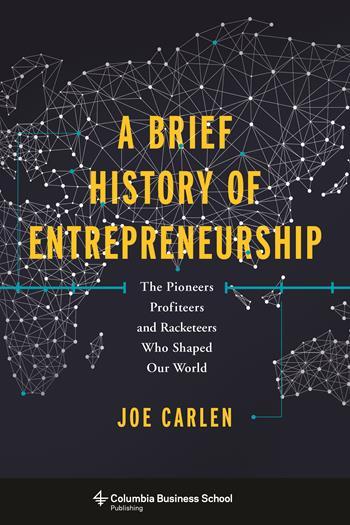Introducing "A Brief History of Entrepreneurship"
“Throughout history, the entrepreneur’s ceaseless quest to discover and/or develop new markets has been pursued through a variety of means, all of which have had an enormous impact on society…. So while this book does not posit a moral argument for or against entrepreneurship, it does argue that it has been a “prime mover,” an instigator of seminal transformations that have altered the course of history.” — Joe Carlen
This week, our featured book is A Brief History of Entrepreneurship: The Pioneers, Profiteers, and Racketeers Who Shaped Our World, by Joe Carlen. Today, we are happy to present an excerpt from Carlen’s Introduction, in which he traces the term “entrepreneur” back to its invention, and explains what made him investigate the history of economic invention.
Don’t forget to enter our book giveaway for a chance to win a free copy of A Brief History of Entrepreneurship!
In 1985, Peter Drucker, the late management expert, defined entrepreneurship as “the act that endows resources with a new capacity to create wealth,” among the most specific and meaningful definitions of the term. More literally, the words “entrepreneurship” and “enterprise” both derive from the Old French word for “an undertaking,” entrependre. Yet even in French, the related word entrepreneur did not take on its current meaning until the economist Jean-Baptiste Say so imbued it in 1800.
In the English language, until the mid-nineteenth century, when the French term entrepreneur began to enjoy common usage outside France, the term undertaker (a literal translation of the French word) was sometimes used in its stead. More frequently, however, the more evocative term “adventurer” was preferred. In this vein, the American economist William Baumol once defined the entrepreneur as “the individual willing to embark on adventure in pursuit of economic goals.” These individuals and the often unintended impact of their adventures on the course of world history are the focus of this book.
Conducting research into this subject, I was particularly intrigued by such examples as Mesopotamian merchants’ creation of the urban market economy, Chinese tea traders’ ingenious invention of “flying” (i.e., paper) money, the central role of the entrepreneur in the onslaught of European colonization from the sixteenth through the nineteenth centuries, and the current “flattening” of the world’s economic playing field—from Cameroon to Cambodia—a product of the modern entrepreneur’s quest for cheaper labor and larger markets.
Throughout history, the entrepreneur’s ceaseless quest to discover and/or develop new markets has been pursued through a variety of means, all of which have had an enormous impact on society. Among others, these methods have included overland and overseas trade, radical innovation of both products and processes, social engineering, territorial conquest, and most recently, interplanetary travel in the form of space tourism for the ultrarich. So while this book does not posit a moral argument for or against entrepreneurship, it does argue that it has been a “prime mover,” an instigator of seminal transformations that have altered the course of history.
Often, these transformations have extended beyond the realm of commerce. Some, such as Phoenician merchants’ colonization of the Mediterranean and the intercontinental Greek and Roman Empires that followed in Phoenicia’s wake, were primarily geopolitical. Others, like the impact of the British inventor-entrepreneurs behind the Industrial Revolution, were more sociological. Others still, such as Mesopotamian merchants’ invention of the shareholder-owned enterprise, developed further by Islamic civilization during the Middle Ages, or the commercialization of African American music, all generated an impact that extended across multiple facets of life.
It is also instructive to learn how entrepreneurship, often kindled by a streak of rebellion, interacted and even struggled with more entrenched aspects of society. Among other examples, this principle is illustrated by the array of entrepreneurial activities undertaken by slaves and recently freed men during the heyday of the Roman Empire and the impact of such enterprise on ancient Rome. Or, more recently, the increasingly Asian, Latin American, and African origins of many twenty-first-century entrepreneurs and their role in blurring, and in some instances even collapsing, the once stark contrasts between the “developing” and “developed” worlds. Indeed the spirit of entrepreneurship is often disruptive, even explosive.
Moreover, as entrepreneurs have helped spur momentous social, economic, technological, and other changes around them, the nature of entrepreneurship itself has been changing. Consequently, this book also discusses the evolving role of the entrepreneur throughout history. For example, as we see in the first chapter, in prehistoric and Mesopotamian times, almost all those seeking “new markets” were traders, while in the succeeding chapter about the Phoenicians, one learns of how entrepreneurial activities began to broaden into the production of finished goods and even a form of commercial colonization.
In the periods covered by subsequent chapters, entrepreneurs also became practitioners of “purposeful innovation,” cross-pollinators, and evangelizers. One also sees how, over time, these once distinct functions have coalesced into the multifaceted and multidisciplinary role of the modern entrepreneur. So in the process of learning about the history of entrepreneurship and its role in shaping our world, one also gains a deeper understanding of each of its vital components. It is a timely era in which to examine this phenomenon; in our interconnected twenty-first-century global economy, the promise, perils, and impact of entrepreneurship have never been more pronounced.






